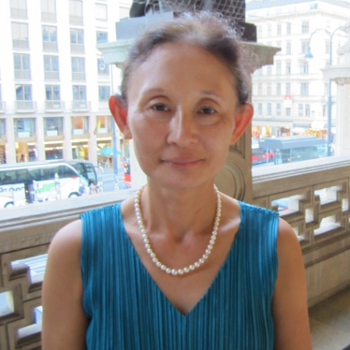Daphne is a late Strauss opera, composed in 1936-37 and premiered in Dresden in 1938. It is a one-act opera, similar in length to two of Strauss’ early successes, Salome and Elektra. It is not performed often; it features two roles whose vocal demands are daunting: the title role and her suitor, Apollo. The Wiener Staatsoper’s revival of its 2004 production by Nicolas Joël makes a strong case for the opera to be performed more frequently. The simple but thoughtful production, brilliant soloists and orchestra were perfect ingredients for an unforgettable evening.
Daphne is based on the Greek myth of the nymph and her transformation into a laurel tree to escape the god Apollo. Per the Staatsoper’s renewed and excellent individual subtitle monitors, Joël’s production “transports the story to the antiquated ambience of the Villa Stuck in Munich, retold as the daydream of a sexually unfulfilled young woman.” It is appropriate that the Villa’s Music Room was used as an inspiration for the set, with its laurel tree panel in the background and brilliant painted ceiling with heavenly blue universe of planets and constellations. The front of the room is a sitting room in art deco style, with a settee and a sleeping cat on the prompter’s box. Two white statues flank the sides of the room, Apollo and Dionysus, the two gods associated with the opera's plot. The laurel-painted screen at the back conceals the mythical world, on a platform reached by steps from the living room, where the main action takes place. The screen rises and falls as the sleeping woman’s dream world becomes blurred with reality.
As the prelude began, Daphne, clad in white and her face painted in white, was observed in her fitful sleep by a bearded man in black, her husband. The man later appeared as Apollo; Apollo’s presence in Daphne’s life from the beginning, strange as it is, matches her words later that she recognized him as a kindred spirit upon meeting him. Other characters, her sweetheart Leukippos, her parents Peneios and Gaea, criss-crossed the two worlds of myth and reality. The backdrop lighting depicting the shifting moods and scenes, blue, red, transparent white, contributed to the success of Joël's imaginative production. In the final scene, the bottom of a gold laurel tree enveloped Daphne in transformation. As a gold column of the Parthenon descended from above, her final wordless songs were heard, with her motif played by the oboe that began the opera returning for the last time, a breathtaking ending.
Simone Young’s conducting may not have teased out all of the nuances of Strauss’ score, but she was mindful of the singers and controlled the orchestral volume so the soloists were always audible. The Vienna State Opera Orchestra was magnificent as usual. The strings were standouts, with the two concertmasters bringing out everything from the whispers of the brooks to the terror of Apollo’s fury. Woodwinds played the major motifs in clear and mournful variety, while the brass and percussion were subtle accompanists.
Even by Straussian standards, the vocal demands of two principal roles are daunting, one of the reasons for the opera’s infrequent performance. Young Austrian soprano Regine Hangler was a magnificent Daphne. Her voice was clear, radiant and brilliant, but never harsh. She captured Daphne’s innocence, naiveté, confusion and remorse with seeming ease whilst negotiating treacherous vocal lines. Her voice rode above and with the orchestra, and her high notes opened with astounding accuracy and flexibility. Hangler may not be the most insightful actress on stage yet, but her beautiful and intelligent singing was more than enough; a triumphant performance.
Andreas Schager, making his Staatsoper debut as Apollo, received a tumultuous ovation with his tireless and courageous singing. His clarion tenor rang out with tremendous power and volume, dominating the drama in his every scene. His strong voice was a good match for Hangler’s crystalline tone, and their duet showcased their strength and heightened the tension in their relationship. Schager’s acting, as a confident, arrogant and later remorseful god, was touching. Not many tenors can scale the heights of Apollo, a taxing of tenor role, and we ought to feel blessed to have Schager in our midst.
Another standout tenor was Benjamin Bruns as Leukippos, whom Daphne recognizes as her true love too late after his murder by the jealous Apollo. Bruns’s penetrating and shiny voice boasted long and smooth legato, and his expressive acting added to Daphne's tragedy. As her parents, veterans Dan Paul Dumitrescu and Janina Baechle impressed with their stage presence although their vocal performances were no more than adequate. The vocal awards of the evening belonged to Hangler in the title role, with Schager making a memorable contribution.




